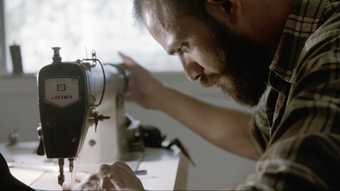Mohajer is the Persian/Arabic word for refugee or traveller. The documentary shows how creating the bags produces a new lifeline for the refugees. It also traces how the lives and stories of the people who used the lifejackets and lifeboats still haunt the bags. The refugees see their bags as an extended memory of the boats which bore them to European shores.
The film will be followed by a panel discussion with the film's director Adrian Oeser, and researchers from QMUL, including Prof. Kavita Datta, and Dr Ashvin Devasundaram.
This event is programmed by Queen Mary University London, a Tate Exchange Associate.
About Queen Mary University London
QMUL is a global university which is committed, through its recruitment, teaching, and public engagement activities, to enhancing the lives of the people of east London and beyond. Our collaborative projects with community organisations focus on building resilience, inviting reflection on shared challenges, and encouraging community cohesion in one of the most diverse areas of the UK. QMUL has a long history of working with arts and culture to benefit local communities and address complex global challenges. The People’s Palace, opened by Queen Victoria in 1887, was originally a community venue where people of the East End could enjoy dance classes, organ recitals, donkey shows and art exhibitions, as well as gain skills in what are now known as the ‘creative industries’ – tailor’s cutting, woodwork, photography, and needlework. Today, QMUL continues to harness the radical power of art to change the world. Our arts and cultural activities embody QMUL’s values of diversity, inclusion, and community engagement.

